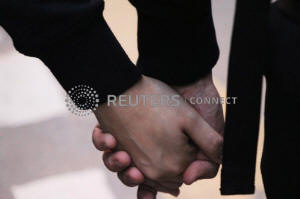First love on the front lines: Coming of age in the Hong Kong protests
 Send a link to a friend
Send a link to a friend
 [February 05, 2020]
By Jessie Pang and Mari Saito [February 05, 2020]
By Jessie Pang and Mari Saito
HONG KONG (Reuters) - Many years from now,
far from the spray of water cannons and the unmistakable smell of tear
gas, they will look back on their season of protest and remember exactly
how they felt.
On this winter day, the march was called off early by police. Two
teenagers walked under the orange glow of a highway overpass. Lights
from police vans swirled ahead, but for the time being, the empty
stretch of road belonged to them. The world felt entirely contained in
that moment, existing only between the young couple on a Hong Kong
street.
The boy tucked a stray hair behind the girl's ear and kissed the top of
her head through the black T-shirt wrapped around his face. The girl
took his gloved hand in hers.
Wing and Tony are two 18-year-olds in love. They are also front-line
protesters in an increasingly violent pro-democracy movement that has
upended this city for seven months. Normally quiet and reserved, the two
have joined thousands of local teenagers in clashes with riot police all
across Hong Kong, their hometown transformed into a battleground between
China's growing reach and people's desire for more democracy.
But even in this extraordinary moment, there are the most ordinary of
adolescent experiences, like first love.

Stories like Wing and Tony's can be found all over this city, private
moments hidden amid the public chaos. Like the movement itself, their
relationship is swept up in the passions and contradictions of the
young: full of both conviction and uncertainty, idealism and fatalism.
Instead of shy first dates where arms brush against the other in the
darkness of a movie theater, Wing found Tony a free helmet and gas mask,
and showed him how to wear them. Rather than texting about where to get
bubble tea, Wing sends Tony's personal details, including his lawyer's
phone number, to friends who are safely monitoring the protests from
home.
The couple, who asked for only their first names to be used because they
fear identification by law enforcement and arrest, met at an orientation
camp during their first semester in college last summer. By then, the
now-scrapped extradition bill, which would have exposed Hong Kongers to
mainland Chinese justice, had already sparked mass protests across the
city. Wing had just broken up with her boyfriend, who refused to join
her at rallies and protests on the weekends.
It was a scorching summer, but for those few days at camp among the
trees, the students were able to forget about the turmoil outside and
return to the teenagers that they were.
A picture of Tony and Wing at camp show them with their faces covered in
painted hearts and moustaches. Wing beams at the camera, while Tony, a
thick monobrow painted on his forehead, feigns resignation.
On one of the last nights of the camp trip, students played a game of
hide and seek on the lawn. The night air was cool and the kids shrieked
as they ran from one another.
"There was a point when a lot of people were chasing after us, so we
were running away together," Wing said. "It kind of felt like we were
running away from the riot police."
After the trip ended, they exchanged numbers. Wing saved Tony in her
phone as "Good Guy" in Cantonese, a term for boys who have been
friend-zoned. Tony saved Wing's number under "Kong Girl," a local
reference to shallow and spoilt women.
Wing (on Whatsapp): Almost done with class.
Tony: I've got a short break too.
Wing: I'm not gonna tell you where I am.
Tony: I know already...You're inside my heart.
Wing: You're crazy. Piss off! Bye bye.
Tony had attended an all-boys secondary school and never had a
girlfriend before. After camp, he couldn't stop thinking about Wing and
her big smile. Unlike him, she came from a privileged background and he
assumed she would be haughty. But as he got to know more about her, his
opinion of her changed. He was surprised and worried when he heard
through friends that Wing was attending pro-democracy protests alone.

Tony had marched a few times in demonstrations, but had become
disillusioned by the police crackdown.
"We couldn't change anything," he said, looking down at his hands. "So,
I figured I'd rather be a happy ignorant pig."
Wing was different. She had already made up her mind to do whatever was
necessary to fight against China's encroachment.
"I thought she was really brave," Tony said. "I didn't expect her to be
so close to the front line."
On the first of October, Tony heard that Wing was heading to the protest
alone, and decided to join her. They were just friends then, relying on
each other to keep the other safe.
The road was a sea of teenagers in black, their faces hidden behind the
heavy fabric of improvised balaclavas. Shards of glass crunched under
their sneakers. A police officer had just shot a young protester at
point-blank range.
Wing grabbed Tony's hand.
Suddenly, riot police were firing rounds of tear gas a block away,
advancing quickly. Tony looked over his shoulder and ran, never letting
go of Wing, her hand sweaty and slippery in his.
Blocks later, they turned down an alley. A middle-aged dishwasher saw
them through her restaurant's back door. "Come in, come in," she said,
beckoning them inside. The two huddled next to a toilet, holding their
breath as police sirens wailed by.
Realizing they were still clinging to each other, Wing dropped Tony's
hand.
After that day, the two began attending more rallies and protests
together. They formed a new daily routine: Tony would pick Wing up from
school or her part-time job as a barista, then they would find a quiet
alley away from the CCTV cameras to change into their "black bloc"
clothes, a front-line uniform of black clothes and masks to blend into
the crowd.
Together, they extinguished tear-gas canisters, dug up bricks for other
protesters to throw, and hid behind makeshift barricades across Hong
Kong. While Wing was always eager to push forward to the front, Tony was
more cautious, keeping an eye on Telegram channels to make sure they
could keep a safe distance from riot police.
"I was more impulsive than him.… I usually think and just go," Wing
said, laughing easily. "At first, I worried that he's one of those
people who would always tell others to leave the protest, but he wasn't
like that. Instead, he would ask why they were leaving."
Rolling his eyes at her, Tony nodded.
"I can be the one to drag her back if she goes way too far to the front
line," he said, jabbing her on the shoulder.
[to top of second column]
|

Frontline protesters Tony, 18, and Wing, 18, hold hands during a
protest in Hong Kong on January 1, 2020. REUTERS/Jessie Pang

The only time Tony could spend time alone with Wing was when he
walked her home from the subway station. Even then, she was consumed
by the protests, constantly checking her phone for updates,
pretending to ignore Tony's repeated attempts to confess his
feelings toward her.
Wing: I want to cry.
Tony: It's gonna be alright. Where do you need to go to bail your
friend out?
Wing: Hospital.
Tony: Did you arrive?
Wing: They said it's not visiting hours and won't let me in. There's
so many police here.
Tony: It's gonna be alright. Did they explain why?
Wing: No, they didn't. I just bailed her out. She can leave after
she sees the doctor.
Tony: Good. Call me if you need anything.
Undeterred by Wing's rejection, Tony tried again to tell her how he
felt. Knowing she liked being by the sea, Tony asked her to meet him
at a waterfront park in Kwun Tong, an industrial area with shuttered
factories overseeing a distant skyline of glittering high-rises.
Stammering a little, Tony tried to take Wing's hand. She shook him
off, saying they weren't in a relationship and shouldn't hold hands.
"Everything's happening too fast. It's not the right time yet," Wing
remembered telling him.
A few weeks later, Wing messaged Tony to ask after one of their
other friends who had disappeared after a protest. When Tony didn't
respond for an hour, Wing called him on Facetime. She relayed the
news that their friend had been arrested.
Tony started crying, blaming himself for not joining his friend at
the protest. He was tucked under the covers of his childhood bed,
his parents sleeping next door.
"I've only seen him crying twice. The first time was when his friend
got arrested, another time was when his grandma lost her vision
because of her disease," Wing said.
Tony had attended nearly every protest by her side, keeping her safe
but never questioning her decision to continue attending rallies
despite the growing risks. Seeing the usually stoic Tony sniffling
on the other side of the phone, she finally admitted to herself that
she saw him as more than a friend.
"Can you be my boyfriend?" she asked shyly.

"Yes, girlfriend," he replied, no longer crying. Finally, he
thought.
Wing: If you haven't fallen asleep yet, I will call you back.
Tony: Just call me, it's fine. This is a 24-hour hotline. I can't
open a 24/7 convenience store but I can be an on-call boyfriend
that's open 24/7.
Wing: LOL
As autumn turned to winter, millions more poured into the streets of
Hong Kong.
Wing and Tony spent an entire week in November facing off against
police near Hong Kong Polytechnic University, which became the site
of a dramatic standoff between university students and riot police.
But they were able to find brief moments of respite to act like
normal teenagers. In December, Tony met Wing's family and he invited
her to his mother's birthday dinner.
Sharing a birthday cake that Wing had baked for his mother, Tony
felt like it was the first time he was experiencing a regular
courtship. His mother liked Wing so much she told her to come back
again for dinner. As they were leaving, his mother pulled him aside
and told him to "keep her safe," knowing the two spent most of their
free time at demonstrations.
Tony's mother just wanted her son to have a stable job and live a
peaceful life. But Tony and Wing don't think they can plan for a
future right now. They feel it's almost certain that one of them, or
perhaps both, will be arrested or injured in the months to come.
"It's like we have no future now," Tony said. "Going out to protest
these days feels like giving the police a chance to arrest us."
Wing puts it down to pure luck that they haven't been hurt or
arrested yet.
"Even if I was injured, though, I'd still go out, because if we
don't speak up now, it will be harder for us to speak up in the
future," she said. "Other people will need to bear the consequences
if we don't go protest now."
On New Year's Eve, Wing and Tony left their gas masks at home and
climbed up the winding concrete steps of Garden Hill in the heart of
Sham Shui Po, a blue-collar neighborhood in Hong Kong's Kowloon
Peninsula.
By midnight, a small crowd had gathered at the top of the hill.
"10, 9, 8," the crowd began to chant.
"7, 6, 5, 4 …" they all counted down in unison.
At the stroke of midnight, Wing yelled out a slogan that she had
spent the past six months screaming at rallies.
"Liberate Hong Kong, Revolution of Our Time!"
Tony stayed quiet.
"I felt odd joining her," he said, not quite knowing why.
Below them, thousands of apartment windows glowed yellow and white
like distant constellations. Tony put his arm around Wing, who
nuzzled his neck.
Asked later what he would do if Wing was arrested, Tony paused for a
moment.
"I will wait for her," he said. Riot charges can carry a 10-year
prison sentence.
"Really?" Wing asked.
"Yes."
"But what if I lost an eye, an arm, or a leg?" she said, defusing
the poignant moment with gallows humor.
"If she got arrested, I'd blame myself for not being able to protect
her," he said. "It's pretty sad that I found my first love during
the protests."
Tony took Wing's hand. It was a rare day away from the front lines.
They planned to spend it wandering around a shopping mall, like they
used to with friends before the protests began. Wing wanted to see
the new "Frozen" movie. Their heads close together, they laughed at
a private joke and walked away, two teenagers in love.
(Reporting by Jessie Pang and Mari Saito; editing by Kari Howard)
[© 2020 Thomson Reuters. All rights
reserved.] Copyright 2020 Reuters. All rights reserved. This material may not be published,
broadcast, rewritten or redistributed.
Thompson Reuters is solely responsible for this content. |